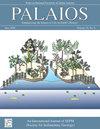印度库奇中生代三角双壳类的体型趋势
IF 1.5
4区 地球科学
Q2 GEOLOGY
引用次数: 1
摘要
摘要:尽管在过去的几十年里,对Cope规则(大小随时间增加的趋势)的实证检验受到了极大的关注,但对该规则在分类学层面的适用性还没有达成共识。在本研究中,我们从目、科、属和种的角度研究了印度库奇地区侏罗纪中期和白垩纪早期Trigonida双壳类的体型分布。我们的数据表明,Trigonida双壳类的体型在侏罗纪中期至晚期没有显著变化,随后在侏罗纪-白垩纪大灭绝边界后有所增加,在白垩纪早期晚期有所减少。相对海平面和相关沉积相组成的变化通常与三角洲双壳类的总体停滞期相关性较差,或者没有净体型变化。跨分类层次的体型分析表明,目级趋势不是较低分类单元级别趋势的简单集合。我们研究的一个重要观察结果是,侏罗纪-白垩纪大灭绝后,体型立即增加,这与灭绝后群落体型减少的一般观察结果有所不同。我们认为,这种增长可能是生态竞争和进化动物群更替的结果。本文章由计算机程序翻译,如有差异,请以英文原文为准。
BODY SIZE TRENDS IN TRIGONIIDA BIVALVES FROM THE MESOZOIC KUTCH, INDIA
Abstract: Although empirical testing of Cope's rule, the tendency for size to increase over time, has received significant attention in the last few decades, there is no consensus about the applicability of this rule across taxonomic levels. In the present study, we investigate the distribution of body size of Trigoniida bivalves, at order-, family-, genus- and species-level, through the Middle Jurassic and Early Cretaceous of the Kutch region in India. Our data suggest that the body size of Trigoniida bivalves did not vary significantly in the Middle–Late Jurassic, followed by an increase after the Jurassic–Cretaceous mass extinction boundary and a reduction in the late Early Cretaceous. Changes in relative sea-level and associated sedimentary facies composition generally exhibit poor correlation with the overall stasis, or no net body size change, displayed by Trigoniida bivalves. Body-size analysis across taxonomic hierarchy reveals that order-level trends are not a simple aggregation of trends at lower taxon levels. An important observation of our study is the body-size increase immediately in the aftermath of the Jurassic– Cretaceous mass extinction, a deviation from the general observation that size reduction occurs in post-extinction communities. We argue that this increase may be result of both ecological competition and evolutionary faunal turnover.
求助全文
通过发布文献求助,成功后即可免费获取论文全文。
去求助
来源期刊

Palaios
地学-地质学
CiteScore
2.80
自引率
12.50%
发文量
40
审稿时长
6 months
期刊介绍:
PALAIOS is a monthly journal, founded in 1986, dedicated to emphasizing the impact of life on Earth''s history as recorded in the paleontological and sedimentological records. PALAIOS disseminates information to an international spectrum of geologists and biologists interested in a broad range of topics, including, but not limited to, biogeochemistry, ichnology, paleoclimatology, paleoecology, paleoceanography, sedimentology, stratigraphy, geomicrobiology, paleobiogeochemistry, and astrobiology.
PALAIOS publishes original papers that emphasize using paleontology to answer important geological and biological questions that further our understanding of Earth history. Accordingly, manuscripts whose subject matter and conclusions have broader geologic implications are much more likely to be selected for publication. Given that the purpose of PALAIOS is to generate enthusiasm for paleontology among a broad spectrum of readers, the editors request the following: titles that generate immediate interest; abstracts that emphasize important conclusions; illustrations of professional caliber used in place of words; and lively, yet scholarly, text.
 求助内容:
求助内容: 应助结果提醒方式:
应助结果提醒方式:


